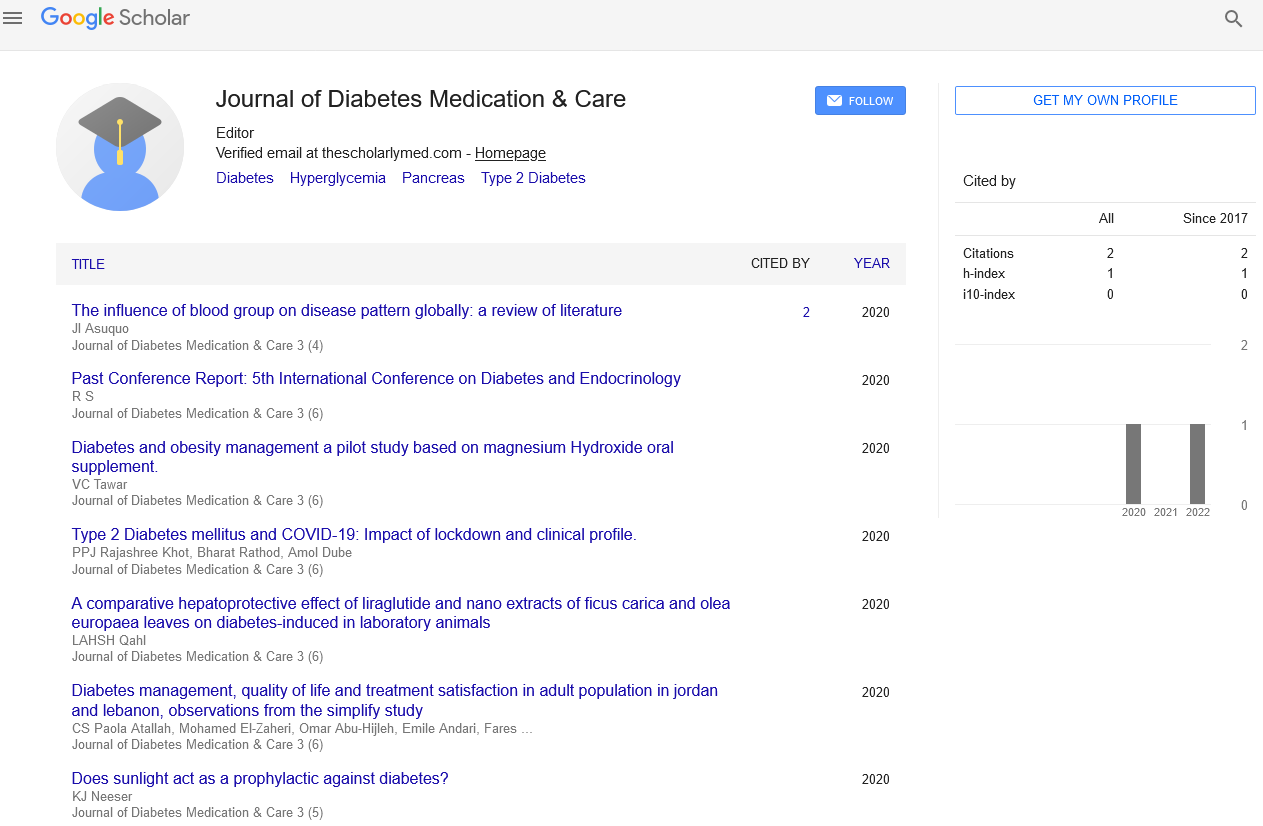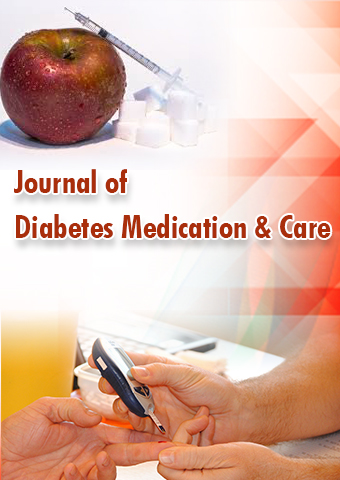Short Communication - Journal of Diabetes Medication & Care (2023) Volume 6, Issue 3
Enhancing Quality of Life in Diabetes
Alina S*
Department of Nutritional, Iran
Department of Nutritional, Iran
E-mail: alin2@nutri.edu.in
Received: 05-June -2023, Manuscript No. jdmc-23-101394; Editor assigned: 08-June -2023, PreQC No. jdmc-23- 101394 (PQ); Reviewed: 23-June -2023, QC No. jdmc-23-101394; Revised: 27-June -2023, Manuscript No. jdmc-23-101394 (R); Published: 30-June -2023; DOI: 10.37532/ jdmc.2023.6(3).58-60
Abstract
Diabetes is a chronic metabolic disorder that significantly impacts the quality of life of individuals living with the condition. The aim of this comprehensive review is to provide an overview of the multidimensional aspects of quality of life in diabetes, including physical, psychological, social, and functional well-being. Living with diabetes presents numerous challenges that can adversely affect various domains of quality of life. Physical factors, such as the burden of disease management, symptoms, and complications, can impact an individual’s physical well-being and daily functioning. Psychological factors, including emotional distress, anxiety, depression, and diabetes-related distress, can profoundly affect mental health and overall quality of life. Social factors, such as stigma, social support, and relationships, play a vital role in an individual’s sense of belonging and social functioning. Finally, diabetes-related functional limitations, such as dietary restrictions, medication adherence, and limitations in physical activities, can impact an individual’s ability to engage in daily activities and affect overall quality of life. Assessing and enhancing quality of life in diabetes requires a multidimensional approach. Various measures and tools, including generic and diabetes-specific quality of life questionnaires, can be used to evaluate different aspects of well-being. Healthcare providers play a crucial role in supporting individuals with diabetes by addressing their unique needs and providing appropriate interventions. These interventions may include education, selfmanagement support, psychological interventions, lifestyle modifications, and access to social support networks. Improving quality of life in diabetes involves a collaborative effort between healthcare providers, individuals with diabetes, and the broader healthcare system. Empowering individuals with diabetes through education, self-management skills, and personalized care can lead to better self-care behaviors, improved glycemic control, and enhanced quality of life. Additionally, addressing psychological well-being, social support, and functional limitations can contribute to better overall outcomes and well-being.
Keywords
Diabetic• Psychological• Metabolic • Medication
Introduction
Diabetes is a chronic metabolic disorder that affects millions of individuals worldwide. It is well recognized that diabetes not only impacts physical health but also has a significant influence on an individual’s quality of life. Quality of life refers to a person’s subjective perception of their overall well-being, including physical, psychological, social, and functional aspects. Understanding and addressing the quality of life in diabetes is essential for comprehensive diabetes care and management. Living with diabetes presents unique challenges that can affect various domains of an individual’s quality of life [1, 2]. The physical impact of diabetes includes the burden of disease management, such as blood glucose monitoring, medication adherence, and lifestyle modifications. Additionally, individuals with diabetes may experience symptoms related to hyperglycemia or complications, which can affect their physical well-being and daily functioning. Psychological well-being is also significantly influenced by diabetes. The chronic nature of the condition, the need for continuous selfmanagement, and the potential for long-term complications can contribute to emotional distress, anxiety, and depression in individuals with diabetes. Diabetes-related distress, which includes worries about blood sugar control, fear of complications, and the impact of diabetes on daily life, can further affect psychological well-being and overall quality of life [3-6]. The social aspects of quality of life in diabetes cannot be overlooked. Stigma associated with diabetes, societal misconceptions, and the need for self-care activities can lead to feelings of isolation and impact social relationships. Support from family, friends, and healthcare professionals plays a crucial role in helping individuals with diabetes navigate these challenges and maintain a healthy social life. Functional limitations related to diabetes, such as dietary restrictions, medication schedules, and limitations in physical activities, can impact an individual’s ability to engage in daily activities and enjoy a fulfilling lifestyle. These functional limitations can further influence overall quality of life and well-being.
Recognizing the multidimensional nature of quality of life in diabetes is essential for providing holistic care to individuals with the condition. Healthcare providers play a vital role in assessing and addressing the various dimensions of quality of life in diabetes [7]. By understanding the challenges faced by individuals with diabetes and their impact on well-being, healthcare professionals can develop personalized care plans that encompass physical, psychological, social, and functional aspects. Improving quality of life in diabetes involves a collaborative effort between healthcare providers, individuals with diabetes, and the healthcare system. Empowering individuals with diabetes through education, self-management support, and access to appropriate resources can enhance their ability to manage the condition effectively and improve their overall quality of life [8, 9].
Quality of life is a crucial consideration in the management of diabetes. Understanding the physical, psychological, social, and functional aspects of quality of life in diabetes allows healthcare providers to address the unique needs of individuals with the condition. By providing comprehensive care that focuses not only on glycemic control but also on enhancing overall well-being, healthcare professionals can contribute to improved quality of life and better health outcomes for individuals living with diabetes [10].
Physical quality of life
This type of quality of life refers to the physical well-being of individuals with diabetes. It includes factors such as symptoms related to diabetes, the impact of diabetes on daily activities, and the burden of disease management. Physical quality of life may be affected by complications of diabetes, medication side effects, limitations in physical activities, and the presence of chronic symptoms.
Psychological quality of life
Psychological quality of life focuses on the emotional well-being of individuals with diabetes. It includes factors such as emotional distress, anxiety, depression, and diabetesrelated distress. Psychological well-being may be influenced by the stress associated with diabetes management, worries about blood sugar control, fear of complications, and the impact of diabetes on daily life.
Social quality of life
Social quality of life relates to the individual’s social interactions, relationships, and sense of belonging. It encompasses factors such as social support, societal perceptions, and stigma associated with diabetes. Social quality of life may be influenced by the individual’s ability to engage in social activities, the impact of diabetes on relationships, and the support received from family, friends, and healthcare professionals.
Functional quality of life
Functional quality of life refers to the individual’s ability to perform daily activities and maintain independence. It includes factors such as dietary restrictions, medication adherence, and limitations in physical activities. Functional quality of life may be affected by the need for self-care activities, the ability to manage diabetes-related tasks, and the impact of diabetes on work or leisure activities.
Overall quality of life
Overall quality of life represents the holistic perception of well-being and satisfaction with life in individuals with diabetes. It encompasses a combination of the physical, psychological, social, and functional aspects discussed above. It reflects the individual’s subjective evaluation of their overall health, happiness, and fulfillment despite living with diabetes.
Conclusion
In conclusion, quality of life is a multidimensional concept that encompasses various domains in the context of diabetes. The impact of diabetes on quality of life extends beyond physical health and involves psychological, social, and functional wellbeing. Individuals with diabetes face unique challenges related to disease management, complications, emotional distress, social interactions, and functional limitations. Recognizing and addressing the different types of quality of life in diabetes is crucial for providing comprehensive care. Healthcare professionals should assess and support individuals with diabetes in managing their physical symptoms, emotional well-being, social relationships, and functional limitations. This may involve personalized treatment plans, education, self-management support, psychological interventions, and access to social support networks. Improving quality of life in diabetes requires a collaborative effort between individuals with diabetes, healthcare professionals, and the healthcare system. Empowering individuals with diabetes through education, self-care skills, and tailored interventions can enhance their ability to cope with the challenges of the condition and improve their overall quality of life. Future research should continue to explore the complex interplay between diabetes and quality of life, identify effective interventions, and develop innovative strategies to enhance well-being in individuals living with diabetes. By addressing the multidimensional aspects of quality of life, healthcare providers can contribute to better health outcomes, increased satisfaction, and improved overall quality of life for individuals with diabetes. Quality of life is a multifaceted concept that encompasses various dimensions of well-being in diabetes. By recognizing and addressing the physical, psychological, social, and functional aspects of quality of life, healthcare providers can help individuals with diabetes achieve better health outcomes and enhance their overall quality of life. Future research should focus on developing targeted interventions and personalized approaches to improve quality of life in diabetes, ultimately leading to better health and well-being for individuals living with the condition.
Ultimately, the goal is to ensure that individuals with diabetes can lead fulfilling lives, effectively manage their condition, and experience a high quality of life despite the challenges posed by diabetes. By providing comprehensive and holistic care, we can make a positive impact on the well-being and overall quality of life of individuals living with diabetes.
References
- American Diabetes Association. Standards of medical care in diabetes. Diabetes Care. 41,152-167 (2005).
- Phramor, Lucy. Validity of claims made in weight management research: a narrative review of dietetic articles. Nutrition Journal. 9, 30 (2010).
- Long Zichong, Huang Lili, Lyu Jiajun et al. Trends of central obesity and associations with nutrients intake and daily behaviors among women of childbearing age in China. BMC Women's Health. 22, 12 (2022).
- Warman DJ, Jia H, Kato H et al. The Potential Roles of Probiotics, Resistant Starch, and Resistant Proteins in Ameliorating Inflammation during Aging (Inflammaging). Nutrients. 14, 747 (2022).
- Fong BY, Chiu WK, Chan WF et al. A Review Study of a Green Diet and Healthy Ageing. Int J Environ Res 18: 8024 (2021).
- Nathan DM, Kuenen J, Borg R et al. Translating the A1C assay into estimated average glucose values. Diabetes Care. 31, 1473-1478.
- Sun J, Buys NJ. Glucose- and glycaemic factor-lowering effects of probiotics on diabetes: a meta-analysis of randomised placebo-controlled trials. British Journal of Nutrition. 115, 1167-1177 (2016).
- Bunn HF, Higgins PJ. Reaction of monosaccharides with proteins: possible evolutionary significance. Science. 213. 222-224 (1981).
- Muley A, Fernandez R, Ellwood L et al. Effect of tree nuts on glycaemic outcomes in adults with type 2 diabetes mellitus: a systematic review. JBI Evidence Synthesis. 19: 966-1002 (2021).
- Raina Elley C, Kenealy T. Lifestyle interventions reduced the long-term risk of diabetes in adults with impaired glucose tolerance. Evidence-Based Medicine. 13, 173 (2008).
Indexed at, Google Scholar, Crossref
Indexed at, Google Scholar, Crossref
Indexed at, Google Scholar, Crossref
Indexed at, Google Scholar, Crossref
Indexed at, Google Scholar, Crossref
Indexed at, Google Scholar, Crossref
Indexed at, Google Scholar, Crossref

